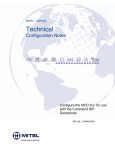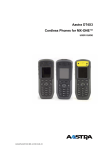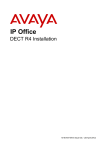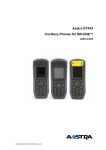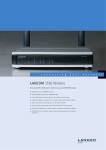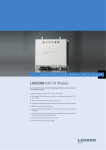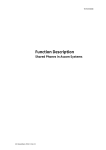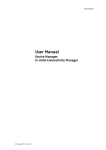Download Technical Configuration Note
Transcript
MITEL – SIP CoE Technical Configuration Notes Configure the MCD for use with the Ascom i62 SIP Device SIP CoE 10-4940-00152 NOTICE The information contained in this document is believed to be accurate in all respects but ® is not warranted by Mitel Networks™ Corporation (MITEL ). The information is subject to change without notice and should not be construed in any way as a commitment by Mitel or any of its affiliates or subsidiaries. Mitel and its affiliates and subsidiaries assume no responsibility for any errors or omissions in this document. Revisions of this document or new editions of it may be issued to incorporate such changes. No part of this document can be reproduced or transmitted in any form or by any means electronic or mechanical - for any purpose without written permission from Mitel Networks Corporation. TRADEMARKS Mitel is a trademark of Mitel Networks Corporation. Windows and Microsoft are trademarks of Microsoft Corporation. Other product names mentioned in this document may be trademarks of their respective companies and are hereby acknowledged. Mitel Technical Configuration Notes – Configure the MCD for use with the Ascom i62 March 2014, 14-4940-00152_3 ®,™ Trademark of Mitel Networks Corporation © Copyright 2014, Mitel Networks Corporation All rights reserved ii Table of Contents OVERVIEW ............................................................................................................... 1 Interop History....................................................................................................................1 Interop Status ....................................................................................................................1 Software & Hardware Setup ...............................................................................................1 Tested Features .................................................................................................................2 Device Recommendations .................................................................................................2 Resiliency ..........................................................................................................................3 Device Limitations ..............................................................................................................4 Network Topology ..............................................................................................................5 CONFIGURATION NOTES ....................................................................................... 6 MCD Configuration Notes ..................................................................................................6 Network Requirements .................................................................................................................... 6 Assumptions for the MCD Programming......................................................................................... 6 Licensing and Option Selection – SIP Licensing ............................................................................ 7 Class of Service Assignment .......................................................................................................... 8 SIP Device Capabilities Assignment ............................................................................................... 9 User and Device Configuration ..................................................................................................... 10 Reroute Assignment ...................................................................................................................... 13 ASCOM I62 CONFIGURATION NOTES ................................................................. 15 iii 14-4940-00152_3 Ascom i62 Overview This document provides a reference to Mitel Authorized Solutions providers for configuring the Mitel MCD to host the Ascom i62 Phone. The different devices can be configured in various configurations depending on your VoIP solution. This document covers a basic setup with required option setup. Interop History Version Date Reason 1 November 8, 2010 Initial Interop with Mitel 3300 MCD 4.2 and the Ascom i62 v2.1.19 2 Mars 3, 2014 Interop with Mitel MCD 6.0 SP3 and the Ascom i62 v5.1.22 Interop Status The Interop of the Ascom i62 has been given a Certification status. This device will be included in the SIP CoE Reference Guide. The status the Ascom i62 achieved is: The most common certification which means the device/service has been tested and/or validated by the Mitel SIP CoE team. Product support will provide all necessary support related to the interop, but issues unique or specific to the 3rd party will be referred to the 3rd party as appropriate. Software & Hardware Setup This was the test setup to generate a basic SIP call between the Ascom i62 SIP device and the MCD. Manufacturer Variant Software Version Mitel MCD Platform 12.0.3.15 Mitel 5330 5.2 Mitel 5340 5.2 Mitel 5360 5.2 Mitel 5624 5.1.18 Ascom i62 5.1.22 1 14-4940-00152_3 Ascom i62 Tested Features This is an overview of the features tested during the Interop test cycle and not a detailed view of the test cases. Please see the SIP Line Side Interoperability Test Pans for detailed test cases. Feature Feature Description Issues Basic Call Making and receiving a call DTMF Signal Sending DTMF after call setup (i.e. mailbox password) Call Hold Putting a call on hold Call Transfer Transferring a call to another destination Call Forward Forwarding a call to another destination Conference Conferencing multiple calls together Redial Last Number Redial MWI Message Waiting Indication T.38 Fax Fax Messages Not Supported Video Video Capabilities Not Supported Teleworker Mitel remote connectivity with Teleworker Personal Ring Group Multiple sets ringing when one number dialed Resiliency Device able to handle one MCD failing - No issues found - Issues found, cannot recommend to use Not tested - Issues found Device Recommendations The Ascom i62 is recommended to be deployed in Device Based mode. If configuring the network for Resiliency, it is recommended to use the Ascom i62 built in Failback Redundancy settings. Refer to the Ascom i62 Resiliency programming section later on in this document. 2 14-4940-00152_3 Ascom i62 Resiliency The following table lists the scenarios of resilience supported by this device when connected to the MCD. Device Scenario 1 Scenario 2 Scenario 3 Scenario 4 Bronze Silver Gold Platinum Not Supported Not Supported Ascom i62 - No issues found - Issues found, cannot recommend use - Issues found Note: Refer to list of device limitations and known issues later in the document for recommendations. The various scenarios are described below. The scenario names are a convenience for understanding this section of the configuration guide. Scenario 1: Resiliency is achieved by utilizing the ability of DNS servers to provide multiple IP addresses against a single FQDN. This is generally achieved by using DNS SRV or A records. This scenario requires nothing from a SIP Endpoint except that it supports standard DNS behaviour. Scenario 2: The device has inherent knowledge of the primary and secondary MCDs and will switch between them if a SIP request (REGISTER, INVITE, or SUBSCRIBE) times out. Behaviour will be characterized based on whether the device returns to primary ICP and when this occurs. This scenario has some dependency on user action in order to detect a failure, especially if configured with a long registration expiry time, so the chance of a user experiencing a long delay making a call goes up. Scenario 3: The behaviour of the device is the same as that of scenario 2, except that the device will “ping" the currently active server with an OPTIONS request. If the OPTIONS request times out, the device will switch to the alternate server for all future requests. The intent of this scenario is to provide much faster failure detection by the device. This will allow devices to failover to their alternate ICP much more quickly, and much more unnoticeably. (If the device can detect a failure of the primary ICP, and can failover immediately, the chance that the user even notices a lack of service falls dramatically.) Scenario 4: The device will support a new SIP header designed specifically for resiliency. The P-Alternate-Server header must be included in a 200 OK or 301 Moved Permanently response. This header will include data that designates the potential servers and which server the UA must use. 3 14-4940-00152_3 Ascom i62 Device Limitations This is a list of problems or not supported features when the Ascom i62 SIP device is connected to the Mitel MCD. Feature Call Park Problem Description The Ascom i62 can only retrieve the last parked call on any given number. Recommendation: This is a known behaviour of call park. See Mitel Support for further information on this feature. PRG The Ascom i62 cannot push a call back to the Personal Ring Group using the Handoff Feature Access Code. Recommendation: This is a known problem with the Personal Ring Group. Contact Mitel Support for further information and reference DPAR MN00326623. DTMF The Ascom i62 do not support in-band DTMF. Recommendation: Use the default DTMF setting (out-of-band, RFC2833). Call Forwarding with MBG The MBG does not currently support device based features. Not tested Recommendation: Use the MCD to configure the Call Forwarding, either with FAC or through the web manager. Contact Mitel Support for further information and refer to DPAR MN00361640. MWI with MBG The Ascom i62 cannot currently SUBSCRIBE for MWI when registering through the MBG. The i62 will not receive a notification if there is a new message waiting in its voice mail. Not tested Recommendation: Mitel is aware of the problem and is working on correcting it. Contact Mitel Support for further information and refer to DPAR MN00361522. 4 14-4940-00152_3 Ascom i62 Network Topology This diagram shows how the testing network is configured for reference. Figure 1 – Network Topology 5 14-4940-00152_3 Ascom i62 Configuration Notes This section is a description of how the SIP Interop was configured. These notes should give a guideline how a device can be configured in a customer environment and how the Ascom i62 was configured in our test environment. Disclaimer: Although Mitel has attempted to setup the interop testing facility as closely as possible to a customer premise environment, implementation setup could be different onsite. YOU MUST EXERCISE YOUR OWN DUE DILIGENCE IN REVIEWING, planning, implementing, and testing a customer configuration. MCD Configuration Notes The following steps show how to program a MCD to connect with the Ascom i62 Phone. Network Requirements • There must be adequate bandwidth to support the voice over IP. As a guide, the Ethernet bandwidth is approx 85 Kb/s per G.711 voice session and 29 Kb/s per G.729 voice session (assumes 20ms packet size). As an example, for 20 simultaneous SIP sessions, the Ethernet bandwidth consumption will be approx 1.7 Mb/s for G.711 and 0.6Mb/s. Almost all Enterprise LAN networks can support this level of traffic without any special engineering. Please refer to the MCD Engineering guidelines for further information. • For high quality voice, the network connectivity must support a voice-quality grade of service (packet loss <1%, jitter < 30ms, one-way delay < 80ms). Assumptions for the MCD Programming • 6 The SIP signaling connection uses UDP on Port 5060. 14-4940-00152_3 Ascom i62 Licensing and Option Selection – SIP Licensing Ensure that the MCD is equipped with enough SIP Device licenses for the connection of SIP end points. This can be verified within the License and Option Selection form. Figure 2 – License and Option Selection 7 14-4940-00152_3 Ascom i62 Class of Service Assignment The Class of Service Options Assignment form is used to create or edit a Class of Service and specify its options. Classes of Service, identified by Class of Service numbers, are referenced by the Station Service Assignment form for the SIP devices. Many different options may be required for your site deployment, but these are the options that are required to be changed from the default for a Generic SIP Device to work with the MCD. • HCI/CTI/TAPI Call Control Allowed set to Yes • HCI/CTI/TAPI Monitor Allowed set to Yes • Message Waiting set to Yes • Conference Call set to Yes • Public Network Access via DPNSS set to Yes • Auto Campon Timer is blanked (no value) Figure 3 – Class of Service 8 14-4940-00152_3 Ascom i62 SIP Device Capabilities Assignment This form provides configuration options that can be applied to various types of SIP devices. The association between the SIP device and the form is similar to how the Class of Service options work. The SIP Device Capabilities number provides a SIP profile that can be applied to particular SIP devices to allow for alternate capabilities as recommended through the Mitel interop process. Ascom i62 is recommended to use the predefined SIP Device Capabilities number 69 Figure 4 – SIP Device Capabilities 9 14-4940-00152_3 Ascom i62 User and Device Configuration On the Mitel MCD, a SIP device can be programmed in the User Configuration form or the Multiline IP Set Configuration form and are programmed as a “Generic SIP Phone”. If Resiliency is required, select the Secondary Element from the drop down box. Figure 5 – User and Device Configuration – Profile Tab 10 14-4940-00152_3 Ascom i62 Enter the Class of Service number and SIP Device Capabilities previously configured in the Service Details tab. Figure 6 – User and Device Configuration – Service Details Tab 11 14-4940-00152_3 Ascom i62 The Login PIN is the SIP authentication password and the username is the DN. The Number and Login PIN must match the information in the Ascom i62 User Configuration. Figure 7 – Multiline IP Set Configuration – Access and Authentication Tab You use the Keys tab in the User and Device Configuration to assign the line type, ring type, and directory number to each line selected on the Ascom i62 device. The Ascom i62 must be programmed with 2 lines to allow Device based In-Call Features. Figure 8 – Multiline Set Key Assignment 12 14-4940-00152_3 Ascom i62 Reroute Assignment Mitel recommends that call forwarding is programmed using the Call rerouting forms of the MCD. Call forwarding programmed from the Ascom i62 has also been tested but we suggest that administrators use Call Rerouting. Call Rerouting is configured at the system to allow for extensions to forward on different conditions to different extensions, i.e. forward to voicemail when no answer. The following is a description how to configure call rerouting and does not necessarily show how this Ascom i62 was programmed. Program the Call Rerouting First Alternative Assignment form with the destination of the call forwarding and the options (Normal, This, Last). Please see the MCD help files for more info. There is also a Call Rerouting Second Alternative Assignment form for more complicated forwarding needs. Figure 9 – Call Rerouting Alternative Assignment 13 14-4940-00152_3 Ascom i62 If any Call Forwarding Always is required then the Call Rerouting Always Alternative Assignment form would need to be programmed. Figure 10 – Call Rerouting Always Alternative Assignment Use the Alternative Numbers from the previous forms and fill out the Call Rerouting Assignment form for the Ascom i62 programmed extension. Figure 11 – Call rerouting Assignment 14 14-4940-00152_3 Ascom i62 Ascom i62 Configuration Notes Configuration notes below cover necessary settings to log in an Ascom i62 to a WiFi network and MCD. For additional configuration of Ascom i62 functionality refer to “Configuration Manual Ascom i62 VoWiFi Handset”. The Portable Device Manager (PDM) is used for administration and programming of the i62 WiFi handsets and exists in two versions, the PDM Windows version and the PDM System version. Below note describes configuration with PDM Windows version. All settings and updates are in this case done via the DP1 Desktop Programmer for i62. The following steps show how to program the Ascom i62 WiFi phone to interconnect with the MCD MCD. In the Start menu, select All Programs > Ascom WinPDM > Ascom WinPDM. 1. Navigate to File > Site Management 2. In Site Management window, click New button and enter the site details as it is shown on Figure 12. Figure 12 – Create new site 15 14-4940-00152_3 Ascom i62 3. Import the package containing the definition file and the software, File>File Management Figure 13 – Add new package 4. Click Numbers tab and then click New button. Enter the handset number, which matches the number created in the Mitel MCD, and ensure that Device type is correct (see Figure 14). Figure 14 – Add new number 16 14-4940-00152_3 Ascom i62 5. Insert Ascom i62 WiFi phone into USB cradle. As soon as new device is detected by USB port, the New Device Wizard window will popup offering to “Associate this handset with number”, “Run template” or “Do nothing”. Select “Associate this handset with number” and then select the number that you have just added (see Figure 15). The prompt to enter user name and password should appear on the phone’s screen. Since this phone has not been configured yet, leave it for now. NOTE: The new configuration settings will come into effect as soon as you remove the handset from USB cradle. Figure 15 – Associate number with device 17 14-4940-00152_3 Ascom i62 6. Click again Numbers tab and right click on the number in right hand pane. Select Edit. NOTE: Alternatively, you can select the number in the right hand pane and then click “Edit” button at the tab’s top. 7. In Edit Parameters screen, collapse System node and select system A. Configure the highlighted parameters (see Figure 16). NOTE: In our test environment we have chosen to use “DHCP mode” and leave the default IP settings intact. NOTE: The setting for “SSID” must match exactly the one configured in your wireless access point. (See next section as an example). Figure 16 – Network Settings 18 14-4940-00152_3 Ascom i62 8. In Edit Parameters screen, expand VoIP node and click General. Select SIP as the VoIP protocol and ensure that the Codec configuration conforms to your Network deployment. Figure 17 – VoIP: General 19 14-4940-00152_3 Ascom i62 In left hand pane, click VoIP and then SIP. Enter the IP address/FQDN of the Mitel MCD. If Resiliency is being used, enter the IP address/FQDN of the secondary MCD. Enter the password of the device as previously configured on the MCD in the ‘SIP proxy password’ field. Ensure that the Registration identity and Authentication identity are Endpoint ID. Set the Hold type to Send Only as shown below. Figure 18 – VoIP: SIP settings for Bronze Resiliency 20 14-4940-00152_3 Ascom i62 Figure 19 – VoIP: SIP settings for Silver Resiliency 21 14-4940-00152_3 Ascom i62 9. In left hand pane, click Device and then Message Centre. The “Message Centre number” is required in order the handset to send SUBSCRIBE message to the MCD (needed for MWI). Enter the extension of the Voice Mail in both the “Message Centre number” and the “Voice mail number”. Figure 20 – Device settings: Message Centre 22



























